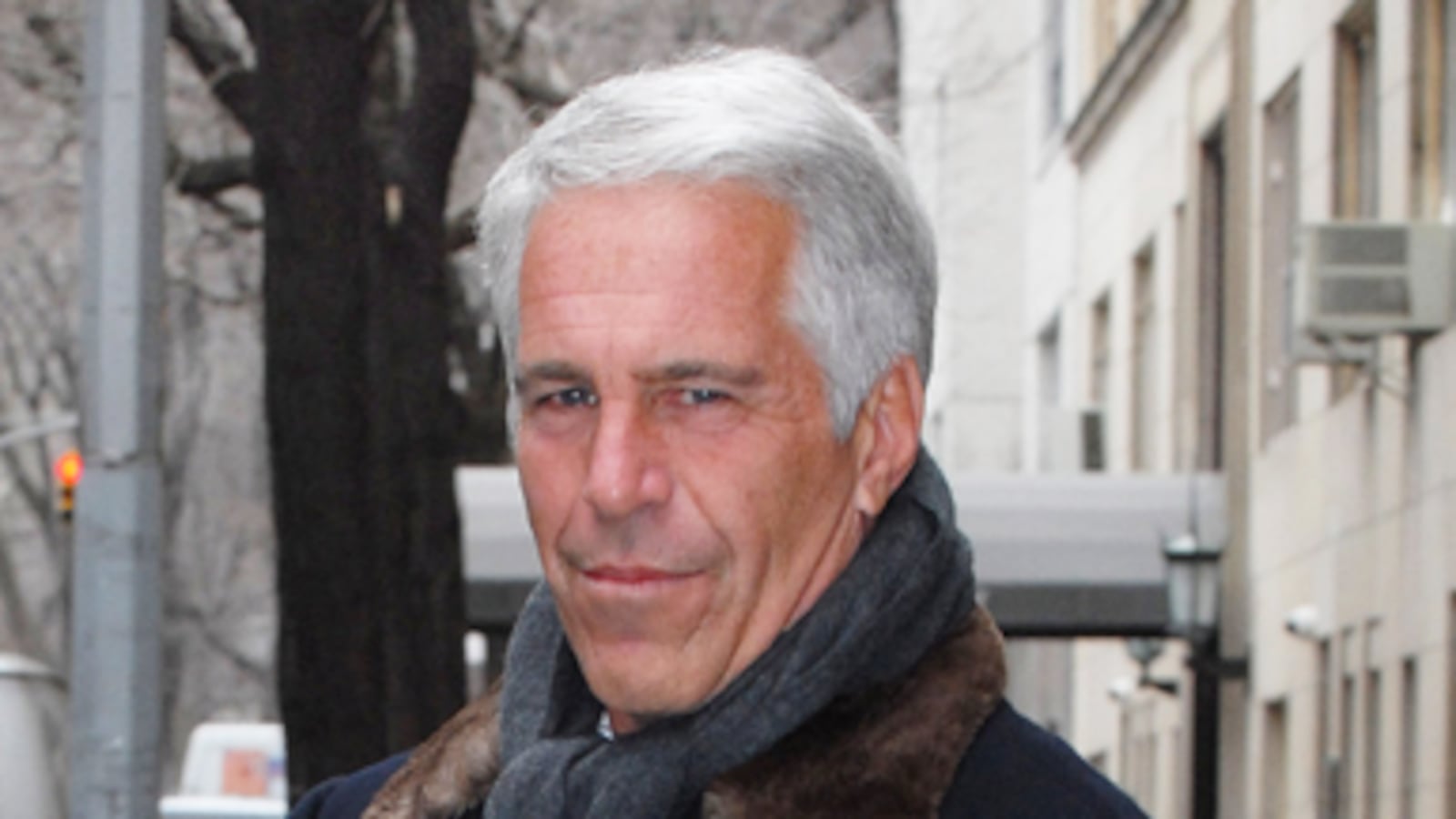Editor's note: Jeffrey Epstein was arrested in New York on July 6, 2019, and faced federal charges of sex trafficking and conspiracy to commit sex trafficking. On August 10, 2019, he died in an apparent jailhouse suicide. For more information, see The Daily Beast's reporting here.
Documents obtained by The Daily Beast reveal how pedophile hedge fund mogul Jeffrey Epstein escaped a hefty jail sentence despite overwhelming evidence of sex crimes with dozens of young girls. Conchita Sarnoff and Lee Aitken on how the fear and intimidation experienced by victims during pre-trial proceedings, combined with a ferocious, protracted campaign to undermine the prosecution, culminated in a set of charges that became a virtual slap on the wrist.
It is proving difficult for hedge fund manager and registered sex offender Jeffrey Epstein to avoid the glare of media scrutiny – British tabloids most recently cried foul over the shabby royal comportment of Prince Andrew in agreeing to be the guest of an acknowledged pedophile. But the larger mystery surrounding Epstein, who completed a 13-month sentence for soliciting prostitution from a minor in 2010, has remained unsolved: How did the hedge fund mogul manage to finesse the kinds of sex-crime allegations typically associated with a hefty prison sentence?

For the first time, the U.S. attorney who oversaw the Epstein prosecution in Florida’s Southern District is commenting publicly on the case, in a letter released exclusively to The Daily Beast. This letter, along with other correspondence unearthed in our reporting, sheds new light on the no-holds-barred battle waged by Epstein’s lawyers to evade the full exercise of prosecutorial power.
Some of the most shocking allegations against Epstein surfaced only after the conclusion of an FBI probe, in civil suits brought by his victims: for example, the claim that three 12-year-old French girls were delivered to him as a birthday present. But the feds did identify roughly 40 young women, most of them underage at the time, who described being lured to Epstein’s Palm Beach home on the pretense of giving a “massage” for money, then pressured into various sex acts, as well as the “Balkan sex slave” Epstein allegedly boasted of purchasing from her family when she was just 14. More recently, a big cash payment from Mail on Sunday coaxed one of Epstein’s main accusers out of anonymity to describe what she claims were her years as a teenage sex toy. This victim, Virginia Roberts, produced a photo of herself with Prince Andrew in 2001 and reported that Epstein paid her $15,000 to meet the prince. Then 17 years old, she claims that she was abused by Epstein and “loaned” to his friends from the age of 15.

Sex crimes of the kind Roberts alleges took place typically carry a term of 10 to 20 years in federal prison. Yet when all was said and done, Epstein served his scant year-plus-one-month in a private wing of the Palm Beach jail and was granted a 16-hour-per-day free pass to leave the premises for work. A Daily Beast examination into the inner workings of the Epstein defense strategy reveals how the fear and intimidation experienced by victims during pre-trial proceedings, combined with a ferocious, protracted campaign to undermine the prosecution – summed up as “the best defense is an all-star offense” – culminated in a set of charges that became a virtual slap on the wrist for the globe-trotting financier. Fear and intimidation experienced by victims during pre-trial proceedings, combined with a ferocious, protracted campaign to undermine the prosecution, culminated in a set of charges that became a virtual slap on the wrist.

“Over the past weeks, I have read much regarding Mr. Jeffrey Epstein,” are words opening an extraordinary letter written by R. Alexander Acosta, who served as U.S. Attorney for the Southern District of Florida during Epstein’s criminal investigation. Mr. Acosta goes on to detail how, in 2005, a young girl first brought sex-crime allegations to the Palm Beach Police Department, which sought felony charges against Epstein. Subsequently, however, the State Attorney agreed to charge him “only with one count of aggravated assault with no intent to commit a felony,” Acosta writes. He notes that such a charge would have resulted in no jail time, no registration as a sexual offender, and no responsibility for restitution to Epstein’s underage victims.
Frustrated by the State Attorney’s decision, the police referred the case to the FBI, which handed it to the U.S. Attorney General’s office. After reviewing the charges, federal prosecutors “agreed that the state charge was insufficient,” Acosta writes. In a script that could have been lifted from Law and Order, his team gave Epstein two choices: “plead to more serious state felony charges…or else prepare for a federal felony trial.”

The next passage is where things really get interesting: “What followed was a year-long assault on the prosecution and the prosecutors.” Epstein had assembled a world-class legal team, including Alan Dershowitz, Kenneth Starr, and Roy Black (best known for having defended William Kennedy Smith against rape charges in Palm Beach.) “One member of the defense team warned me that the office’s excess zeal in forcing a good man to serve time in jail might be the subject of a book if we continued,” Acosta writes. In his view, excessive zeal more aptly described the actions in Epstein’s camp: “Defense counsel investigated individual prosecutors and their families,” seeking to unearth personal issues that might lead to disqualification of members of Acosta’s team. The defense also “often failed to negotiate in good faith. They would obtain concessions as part of a negotiation and agree to proceed, only to change their minds, and appeal the office’s position to Washington.”
Undeterred, Acosta stuck to his position that Epstein must agree to the three criteria he had laid out: jail time, registration as a sex offender, and restitution to victims.
Acosta’s account is supported by a second document obtained by The Daily Beast – a five-page letter written by Assistant U.S. Attorney Ann Marie Villafana to another of Epstein’s lawyers, Jay Lefkowitz, during the period when both sides were hammering out the eventual plea agreement. “The indictment was postponed for more than five months to allow you and Mr. Epstein’s other attorneys to make presentations to the office to convince the office not to prosecute,” Villafana writes, conjuring the degree of pushback apparently central to the team’s strategy. “Those presentations were unsuccessful.” Villafana also mentions her efforts to insure that Epstein would serve time in a federal “prison camp” and not a state prison, which would be a far rougher environment, particularly for a child molester.
Villafana marshals these facts in the process of strenuously disputing apparent charges of misconduct by the defense: “I continued to work with you in a professional manner even after I learned that you had been proceeding in bad faith for several weeks – thinking that … you would 'fool' our office into letting Mr. Epstein plead to a non-registerable offense.”
At another point in her letter, Villafana refers to an apparent allegation of self-dealing in the selection of an outside attorney who would represent the 40-odd victims identified in the FBI probe. In a somewhat unusual arrangement, Epstein agreed not to contest his liability in any civil suits brought by these victims – and in fact to pay for lawyers to represent them. In her letter, Villafana denies any personal interest in the choice of attorney and goes on to say, “your attacks on me and on the victims establish why I wanted to find someone whom I could trust with safeguarding the victims’ best interests in the face of intense pressure from an unlimited number of highly skilled and well paid attorneys.”
Responding to a request for comment on Acosta’s account of events, Roy Black wrote The Daily Beast on Thursday that, “I can’t reply to a letter I haven’t received…I can’t give a reasoned response without examining the files and being able to refresh my recollection of events that occurred years ago.” Black went on, “I do not believe any of the things you mention occurred except for the fact we did exercise our right to appeal to the Department of Justice to determine if a federal crime had been committed.” (Other Epstein attorneys contacted by The Daily Beast did not respond. The U.S Attorney’s office for the Southern District of Florida had no comment.)
Why did Acosta decide to voice his opinions now? In part, he clearly is reacting to ongoing criticism that Epstein’s puny punishment did not fit his crimes. “Some may feel that the prosecution should have been tougher,” Acosta writes. “Evidence that has come to light since 2007 may encourage that view. Many victims have since spoken out…physical evidence has since been discovered.”
Acosta may also have chosen to come forward now because, on Monday, attorneys for a number of those victims filed suit under the Victims Crimes Rights Act to challenge the “non-prosecution agreement” that ultimately resulted from all the wrangling, claiming that they were not consulted. The U.S. Attorney’s office, now led by Wifredo A. Ferrer, has indicated it will file a response to the suit on April 7.
In his letter, Acosta also takes issue with the way Epstein’s sentence was carried out: “Although the terms of confinement in a state prison are a matter appropriately left to the State of Florida…without doubt, the treatment that he received while in state custody undermined the purpose of a jail sentence.” Indeed, Epstein’s brief confinement likely reinforced a perception that he had merely succumbed to a nuisance suit. Such a gross misapprehension would help account for the apparent ease with which Epstein has rejoined the ranks of a social elite. Katie Couric, Woody Allen, and George Stephanopoulos, among others, attended a dinner party he hosted for Prince Andrew in December, and New York authorities seem to be either unaware or unconcerned that his Upper East Side home is within 1,000 feet of an Episcopal pre-school, in violation of sex-offender laws.
Yet a source tells The Daily Beast that Epstein’s legal troubles may not be over. It is possible that, as an outgrowth of the 2007 Florida investigation, federal investigators are now looking into allegations of money laundering and other financial misdeeds. Villafana notes at the end of her letter to Lefkowitz: “You accuse me of broadening the scope of the investigation without any foundation for doing so by adding charges of money laundering and violations of a money transmitting business to the investigation. Again, I consulted with the Justice Department’s Money Laundering Section about my analysis...the duty officer agreed with my analysis.”
Conchita Sarnoff has developed multimedia communication programs for Fortune 500 companies and has produced three current events debate television programs, The Americas Forum, From Beirut to Kabul, and a segment for The Oppenheimer Report. She is writing a book about child trafficking in America.
Lee Aitken is an editor and writer who has worked at Time Inc., the New Yorker, Condé Nast Traveler, and the International Tribune, among others. She lives in Washington, D.C. with her daughter.






